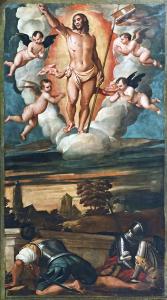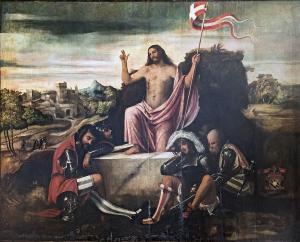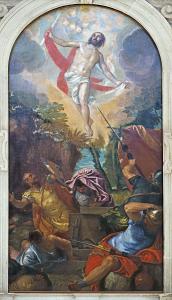 It is the day after Easter, April 13, 2020, and I imagine all of you had the strangest celebrations of the Great Feast of Christianity that you ever had. I know I did. In my distant past—1971, I believe—I sang Handel’s bass aria, “The Trumpet Shall Sound,” six times for six successive Easter services in a large Dallas church. The final three of those services that day were replete with huge brass choirs, large vocal ensembles of every age, and enormous congregations lustily belting the ubiquitous hymn, “Christ, the Lord, is Risen Today,” topped off with more Handel, “The Hallelujah Chorus,” of course. It was church in the fast lane for sure, and all went home full of sound and glory.
It is the day after Easter, April 13, 2020, and I imagine all of you had the strangest celebrations of the Great Feast of Christianity that you ever had. I know I did. In my distant past—1971, I believe—I sang Handel’s bass aria, “The Trumpet Shall Sound,” six times for six successive Easter services in a large Dallas church. The final three of those services that day were replete with huge brass choirs, large vocal ensembles of every age, and enormous congregations lustily belting the ubiquitous hymn, “Christ, the Lord, is Risen Today,” topped off with more Handel, “The Hallelujah Chorus,” of course. It was church in the fast lane for sure, and all went home full of sound and glory.
Not yesterday. My wife and I watched on-line as our pastor preached in an empty, albeit quite beautiful, sanctuary, our solo quartet, along with our choir director, himself a fine singer, sang that hymn, and, yes, closed the service with Handel. The Hallelujah Chorus sounds distinctly different when sung by five voices, and even my now tinny bass, boomed into the confines of our tiny house, would have made no addition to the computer sound. How very peculiar it was, moving in its own unique way, but compressed, compact, and isolated. Vimeo and Zoom only go so far, and are certainly no substitute for the gathered throng.
Then followed for me perhaps the strangest thing of all—Sunday School on Easter! At nearly all of the churches I have been part of, Easter Sunday School was either suspended or became the hour for parties and chatty get-togethers. For members of the choir, of course, it was a time—if there was in fact any time—to catch a breath before charging back into the loft for another service. When noon, or so, finally arrived, we singers stumbled home in silence, glad that the Easter onslaught was again past, and anxious for the canceled rehearsal that was inevitable for the post–Easter exhausted. But yesterday, at 11:00AM, there I was leading a Zoom chat/lesson on Easter; it was decidedly a first for me, not the first Zoom event, experiences that have become common (don’t you wish you had some Zoom stock?), but my very first Easter Sunday School lesson. And inevitably the subject was resurrection. What else? I was very interested in seeing what my fellow parishioners, about 25 of them on the computer, thought about this central event of the Christian life.
First some background. Westwood United Methodist Church of Los Angeles is a very progressive congregation. We protested loudly at the overt injustice of the recent called General Conference of our denomination in Feb, 2019, and generally now name our house of worship, Westwood Church, leaving out the United Methodist part as a proclamation to the world that we welcome and readily include all persons into our fellowship; there are no barriers to membership and engagement with us, least of all gender and sexual orientation. Our members in the main and with few exceptions are open to all manner of persons and open to all sorts of theological expressions. Thus, I was eager to hear some of my friends express what they thought of this idea of resurrection we had just virtually celebrated.
Now some personal background. I have been a serious Christian, even an ordained clergyperson, for 50 years. Having not been raised in the church, and surely before my entrance into seminary, I had the idea that there were certain things any Christian was required to espouse, among them the actual bodily resurrection of Jesus. I readily admit that I never actually embraced that notion, finding it frankly incredible, but I swallowed hard and swallowed the belief, imagining that every Christian, and certainly every Christian pastor, simply had to believe that at least, if he or she was to be enabled to preach the gospel with integrity. If seminary taught me anything, it was that long-held traditional belief systems must by necessity be questioned deeply and thoughtfully. It was not long into my seminary training that I discovered that I was hardly the first person, and definitely not the first serious Christian, who did not believe in the historical occurrence of Jesus’s resurrection from death. Such a discovery was wonderful for me, because it meant that did not need to lie to be a minister, not having to believe, as the Red Queen of Alice fame, “six unbelievable things before breakfast.” Still, if I did not believe in the bodily resurrection, then what in the world did Easter mean at all? It is always easier to undercut accepted belief than it is to substitute something substantial for what has been discarded.
The Bible as always was most helpful in my search for that fresh belief. I knew all too well, having it said at many of the funerals I attended, though not at the ones I was officiating, that Jesus’ resurrection meant the certainty of our own resurrection. Indeed, the funeral service of the United Methodist Church includes the famous words from John’s Gospel, “I am the resurrection and the life; those who believe in me, even though they die, yet shall they live.” These words are followed by phrases from the Revelation of St. John (clearly a different John), “I died, and behold I am alive for evermore; because I live, you shall live also.” These words imply strongly that belief in the resurrection of the body of Jesus means in effect that I, like him, will in my body live forever. I would go so far as to say that that is the most common understanding of the event of Easter; Jesus is alive forever, and because of that I too shall live forever.
Such a notion, I think, is based partially on a misapprehension of what the Bible actually says about our bodies. In both the Hebrew Bible and in the Greek New Testament the words used for “body” do not suggest a body apart from some soul, encased in that body. Rather, Hebrew nephesh and Greek soma both mean the whole person. A human being is not a soul having a body, but a body capable of having a certain quality of life, what Greek calls psyche. Thus, when John’s Jesus proclaims, ‘I am the resurrection and the life,” he suggests that belief in him may even today, now, lead to a resurrected life, a life lived in the call and way of God. Though many theologians through many centuries attempted to teach the idea of the immortality of the soul, and thereby focused largely on the futuristic element of resurrection, once it is seen that the “soul” is not indivisible from our whole persons, the exclusive focus on immortality is a misplaced focus.
Resurrection is in fact a gift of God’s new creation, not some sort of birthright due to the soul’s supposed immortality. Jesus is not so much “risen,” as he was raised by God as a sign of the new creation. Also, resurrection biblically is a transformation that occurs in the present leading into the future (see Romans 6:1-11; 1 John 3:14-17); one may be this very day resurrected into this new creation, among whose gifts is the power over death. If one lives now a resurrected life with God, even death cannot defeat such power. The exact parameters and outlines of our post-death existence are forever a mystery; there is no need for us to speculate about it or imagine that we know anything about it. Whatever it is, it is a gift from God for those who have been grasped, and who have grasped, the new resurrected life in God through Jesus. In the end, resurrection in the Bible is the ultimate vindication of God’s victory over sin and death; death cannot have the final word in the gift of the resurrection life.
How then do I understand what the resurrection actually is? For me, and I speak here only for me, it is the story of the resurrection as told by all four gospels and Paul, in all of their differences and variations, that impacts fully how I try to live my life in God. Whatever claims to history that have been made for this event are finally irrelevant for my convictions about the Easter story. It is only a post-Enlightenment people who insist that the only truth there is must be historical. Not only is that claim in error, it is poverty- stricken. Truth is far larger than that; if it were not, we all would be in the grip of the absolute need for historicity before we could live at all. I refuse to live my life always waiting for my truth to be falsified through the latest historical finding. The story of God’s power over death is real and true forever, and is in no need of history to make it so. Christ is risen indeed, and in the story of his being raised, I find my ultimate and rich reason for living my life searching for the new creation he has come, through the power of God, to inaugurate.
I am pleased to report that at least two of my listeners yesterday thanked me for voicing what they had long believed about resurrection, but were too fearful of saying, namely that the resurrection of Jesus meant far more than a dead man come back to life. The resurrection story means nothing less than the announcement that a new creation is available for all, a place where justice reigns, where righteousness is the very mode of human existence, and where God may at last rule in our lives. In that story lies the very power of God made manifest in Jesus.
(Images from Wikimedia Commons)











